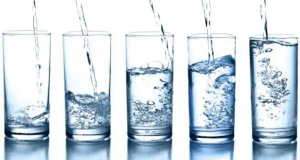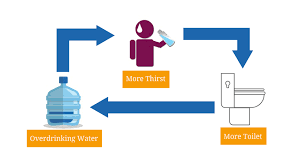The most common question and advice that we receive in our daily life these days is “How many liters of water are you drinking each day?”, “Drink plenty of water”, “Drink 8 glasses of water a day”, etcetera. But the fact is that drinking more than an adequate amount of water, which is known as overhydration, some time might cause HYPONATREMIA.
Water accounts for 60% of the adult human body and is mandatorily essential to every other cell in the body. Drinking an adequate amount of water has a ‘n’ number of benefits which includes, delivering oxygen throughout the body, regulating body temperature, better digestion, flushing out toxins, aiding weight loss, boosting asking health and beauty etcetera. Overall, HYDRATION IS VITAL. But in an attempt to prevent dehydration, some people might get misguided and end up in OVERHYDRATION!
How much water is to be consumed?
There isn’t any rigid answer on what is the amount of water to be intake per day. But, the thumb rule is to drink two to three cups of water an hour (possible standard amount) or a cup of water more if you are sweating heavily. There might be cases where you have to limit the water intake less than the standard amount including heart failure, a particular type of kidney disease. It is always better to consult your doctor if you are confused about “How much water is too much?” for you than ending up in overhydration.
What is overhydration?

Overhydration, in simple terms, means “condition in which the body contains too much water” or “Imbalance of fluids”. Overhydration might lead to water intoxication. Water intoxication occurs when sodium and other electrolytes in the body are diluted too much. So, do not stick to the rule – “Drink plenty of water” without understanding the full essence of it.
Types of overhydration
Overhydration can be distinguished into two types – Retaining the water intaken and Increased water intake.
Retaining water
Retaining water occurs when the human body can’t get rid of the intaken water in a proper way. There are several medical conditions in which the body retains water instead of excreting whenever necessary.
Increased water intake
When the water intake is more than what the kidney can remove, then this causes too much of water collection in the bloodstream.
Reasons for overhydration
- Excessive thirst as a result of physical activity or hot weather
- Diagnosed with diarrhoea, fever, or vomiting
- Marathon runners, cyclists, and elite athletes & rowers
- Drinking water in the name of maintaining skin and health
- Dieters who think they can swap hunger with water so that they can starve off cravings
- Fasting – where people have the misconception of drinking water throughout the day instead of having solid food
Result of overhydration

Exceeding the required amount of water might even result in Water Poisoning. This is a condition where the kidneys are overworked and cells are swollen temporarily. Thus, swelling in the brain puts pressure on the skull causing headaches. Also, when the sodium and potassium salts in the body are diluted way too much, people land up in muscle cramps and tiredness. Overhydration also causes diarrhea, fluid build-up in the brain, seizers, unconsciousness, muscle weakness, blurry vision, pressure on the heart, acute kidney injury, and even coma!
HYPONATREMIA is a medical term used to express the sodium imbalance in the human body. When sodium in the body is diluted way too much then electrolytes are dangerously out of balance causing nausea, headache, and drowsiness.
Despite all these activities by a human, the human body has a built-in defense mechanism that signals us prior to intoxication. For example, sometimes we feel swallowing inhibitions where swallowing becomes extremely difficult and this is a defense activity from the body against overhydration.
Treating overhydration
Treating overhydration may vary according to the root cause of the problem. Common treatments include,
- Limiting the amount of water intake consciously
- Taking diuretics to increase the amount of urine excretion
- Replacing sodium as and when possible
- Stopping any medicine that causes overhydration
- Increasing the amount of electrolytes and salts intake to balance the fluids in the blood
Despite all of these, the best and permanent way to treat overhydration is to find the root cause and treating it.
Advice to hydration maniacs
- Drink water only when you are thirsty
- Do not drink water more than what you are losing from the body
- Each time you urinate, check the color of your urine. Check the color code below.
*Dark yellow – Oops! Your body requires more water! Go, grab a bottle.
*Pale yellow – Congrats! You are not a hydration maniac!! (normal and relax)
*Clear like crystal – Sorry, you are OVERHYDRATED, so STOP IMMEDIATELY!!!
Hydrate safely
People who are obliged to hydrate more (possibly, marathon runners/cyclists/ elite athletes/rowers) can consider the below methods to keep yourself away from overhydration.
- When you are involved in the activity that would demand you to consume more water, have the reusable water bottle in hand but do not force yourself to consume a specific amount of water in a particular time interval
- Consult with your physician and try using sports beverages, electrolyte drinks, or hydration tablets dissolved in water, but keep track of the supplements as per the advice of your physician
- Keep track of the amount of water intake with the apps available in play stores like fitbase so as to not exceed the proper level. While tracking do not forget to add the amount of water that you intake via juice, buttermilk, alcohol, tea/coffee, milk etcetera
- Increase your intake of water-rich fruits, vegetables, or greens like watermelon, lettuce, cucumber, celery, tomatoes, melons etcetera
Conclusion
To conclude, though we aren’t sure of the metric that is to be maintained for water intake, we are clear on the dos and don’ts of overhydration. In precise the correct amount of water intake depends on many other factors like age, gender, climate, health conditions etcetera. So, always listen to your body because you don’t need to consciously think about hydration as the thirst mechanism will itself guide you on when your body requires water. So, people DON’T “DRINK PLENTY OF WATER” and end up in OVERHYDRATION!!!
To keep yourself healthy along with water intake, do give a read on a NUTRITIONAL DIET.
